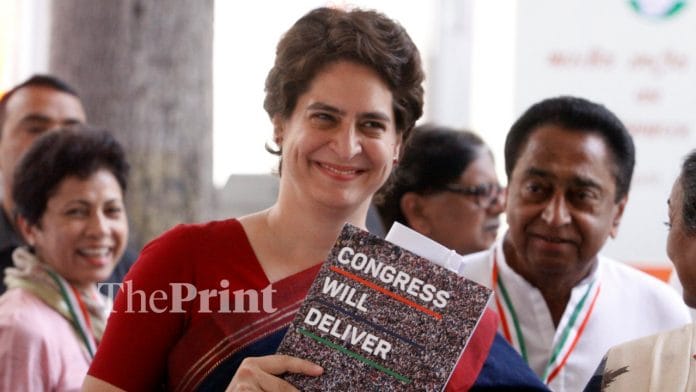New Delhi: From a simplified GST and no e-way bills to exempting MSMEs from several laws for job creation and merger of state-run banks, the Congress has focussed on all the crucial areas in its election manifesto released Tuesday.
The manifesto proposes to abolish angel tax and provide a tax regime for foreign investors with no retrospective taxation — two measures that were a legacy of the Congress’ own rule between 2009 and 2014.
ThePrint looks at some of the major takeaways of the manifesto.
Also read: Will get Pakistan to end support to terror groups, Congress promises in poll manifesto
Jobs
Flagging unemployment as the ‘gravest challenge’, the Congress has proposed several measures to bring down the record 6.1 per cent unemployment rate.
The Congress promises a new ministry — Ministry of Industry, Services and Employment — to link employment with industry and services. It also promises to fill up all the 4 lakh vacant posts in central government, public sector enterprises and judiciary by the end of 2019-20.
The manifesto advocates tax incentives to employment generating industries like construction, textiles, leather and tourism. Regulatory forbearance for micro, small and medium enterprises, exempting them from all laws, excluding wage and tax laws, has also been promised. An expansion of job-creating health and education sector and inclusion of apprenticeship as part of the definition of what constitutes corporate social responsibility spending are among some of the other promises.
GST and tax reforms
The Congress manifesto promises a ‘GST 2.0’ regime that will be easy to understand and execute. A single moderate rate of tax on all goods and services with a special rate of duty for demerit goods, inclusion of all excluded items like petroleum products, real estate, tobacco and liquor under the GST ambit within two years and allocation of GST revenues to village panchayats are some of the other promises.
It also proposes to do away with e-way bills or the requirement to carry electronic documentation showing movement of goods both intra and inter-state. E-way bills have been a sore point for both traders and transporters. Besides, the manifesto promises to do away with tax terrorism and implementation of the new direct tax code within the next one year.
Notably, all decisions on GST can be taken only by the GST council, a body comprising representative of the Centre and the states, thereby making some of these promises impossible to fulfill.
Also read: What Rahul Gandhi missed out when he promised higher GDP expenditure on education, NYAY
The economy
The Congress, in its manifesto, also promises to adhere to the fiscal deficit targets and “reverse the BJP government’s fiddling” with the targets. To deliver high and sustained growth, it promises to initiate steps to encourage private sector investment, generate more household savings to increase the savings level to 40% of the GDP, attract foreign direct investment and review of rules and laws governing investment in three months.
The manifesto also promises to lift 10 crore people out of poverty in the next five years and eliminate poverty by 2030. It reiterated its minimum income support promise of Rs 72,000 per annum to the poorest of the poor households. On the ease of doing business, the Congress promises to bring in a new law to make it easier for firms to do business.
The manifesto also proposes to increase the share of manufacturing to 25% of GDP from 15% at present. Countering Narendra Modi government’s ‘Make in India’ scheme, the Congress manifesto promises a ‘Make for the World’ policy where Indian and foreign manufacturers will be encouraged to manufacture items for export.
Banking reforms
The manifesto envisages six to eight well-capitalised state-run banks from nearly 20 banks at present. It also promises governance reforms at state-run banks, abolition of the ‘redundant’ banks board bureau that was tasked to make top level appointments. A simplified know-your-customer norm, measures to prevent frauds and creation of an ‘India Global’ companies fund to help Indian companies become global companies are some of the other promises.
However, there is no mention in the manifesto on ways to tackle Non-performing assets (NPA), a key problem facing the Indian banking system.
On RBI, the manifesto promises to respect the autonomy of the India’s central bank, and “reverse the unwarranted and illegal interference by the BJP government” into its functioning.







Dil ke behlane ke liye, khayaal achha hai Ghalib. For whatever an Election Manifesto may be worth in practical terms, these are the issues that matter to Indians. Time to drag the cursor firmly back to the centre. There is zero appetite for what Yogiji is showing us to be India’s future.